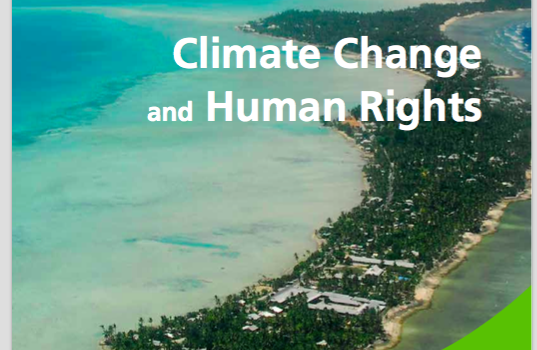Climate Change and Human Rights (UNEP) (December 2015)
By: Michael Burger and Jessica Wentz (UNEP)
The report describes the nexus between climate change, environmental degradation, and the impairment of fundamental rights, such as the rights to food, water, housing, and life. It has long been recognized that a clean, healthy and functional environment is integral to the enjoyment of these human rights. And anthropogenic climate change is now the largest and most pervasive threat to the natural environment and human societies.
The IPCC’s latest assessment report provides a detailed picture of how the observed and predicted changes in climate will adversely affect ecosystems, natural resources, and the environmental processes that support access to clean water, food, and other basic needs. These impacts, combined with direct harms to people, property, and physical infrastructure, pose a serious threat to the enjoyment and exercise of human rights across the world. This is not merely an abstract, future possibility. Climate change is already affecting temperatures, hydrologic conditions, ecosystem functioning, and agricultural productivity in many regions. Displacement is also an imminent prospect for some communities, such as those situated in the rapidly melting Arctic and low-lying coastal areas.
Further complicating the picture, measures undertaken to mitigate greenhouse gas (GHG) emissions and adapt to climate change can themselves adversely affect the enjoyment of human rights. The international community has pledged to allocate or direct $100 billion (US) per year to funding mitigation and adaptation projects in developing nations. It is critical that as the world endeavors to address climate change, it do so with full respect for human rights.
Within this context, the report explains how governments and other actors may address climate change in a manner consistent with their obligations to respect, protect, promote and fulfill human rights. One key goal is to inform the decisions undertaken at COP21 and future international climate negotiations. Another key goal is to inform decisions and actions undertaken by nations, sub-national governments, international organizations and private actors pursuing climate action both within and beyond the context of the UNFCCC in the coming years.

